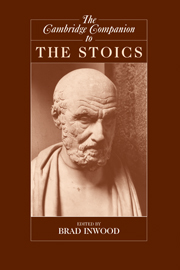Book contents
- Frontmatter
- Introduction
- 1 The School, from Zeno to Arius Didymus
- 2 The School in the Roman Imperial Period
- 3 Stoic Epistemology
- 4 Logic
- 5 Stoic Natural Philosophy (Physics and Cosmology)
- 6 Stoic Theology
- 7 Stoic Determinism
- 8 Stoic Metaphysics
- 9 Stoic Ethics
- 10 Stoic Moral Psychology
- 11 Stoicism and Medicine
- 12 The Stoic Contribution to Traditional Grammar
- 13 The Stoics and the Astronomical Sciences
- 14 Stoic Naturalism and Its Critics
- 15 Stoicism in the Philosophical Tradition
- Bibliography
- List of Primary Works
- Index
Introduction
Stoicism, An Intellectual Odyssey
Published online by Cambridge University Press: 28 May 2006
- Frontmatter
- Introduction
- 1 The School, from Zeno to Arius Didymus
- 2 The School in the Roman Imperial Period
- 3 Stoic Epistemology
- 4 Logic
- 5 Stoic Natural Philosophy (Physics and Cosmology)
- 6 Stoic Theology
- 7 Stoic Determinism
- 8 Stoic Metaphysics
- 9 Stoic Ethics
- 10 Stoic Moral Psychology
- 11 Stoicism and Medicine
- 12 The Stoic Contribution to Traditional Grammar
- 13 The Stoics and the Astronomical Sciences
- 14 Stoic Naturalism and Its Critics
- 15 Stoicism in the Philosophical Tradition
- Bibliography
- List of Primary Works
- Index
Summary
Stoicism has its roots in the philosophical activity of Socrates. But its historical journey began in the enrichment of that tradition with other influences by Zeno of Citium almost a century after Socrates' death, and it continued in the rise and decline of the school he founded. An apparently long pause followed during the Middle Ages, although it seems clear that its philosophical influence continued to be felt through a variety of channels, many of which are difficult to chart. In the early modern period, Stoicism again became a significant part of the philosophical scene and has remained an influential intellectual force ever since.
In the middle of the last century, Max Pohlenz, in a book whose value was always limited by the cultural forces of its time and place (Pohlenz 1948), described the school as an ‘intellectual movement.’ ‘Intellectual movement’ captured something of the longevity and protean variability of Stoicism. The dynamic connotations of that metaphor are apt, but I prefer the metaphor of a special kind of journey. An intellectual engagement with Stoicism is an odyssey in three ways. First, the historical trajectory of the school itself and its influence is replete with digressions, narrative ornament, and improbable connections, yet moving ultimately toward an intelligible conclusion. Second, the task of recovering the history of Stoic thought is an adventure in the history of philosophy. It can be a perilous journey for the novice, one requiring guides as varied in their skills and temperaments as was Odysseus, whose epithet polutropos (‘man of many talents’) indicates what is called for. And third, for those readers who find the central ideas of Stoicism appealing either in a purely intellectual way or in the moral imagination, the ongoing confrontation with Stoicism is one which refines philosophical intuitions, challenges both imagination and analytical talents, and leads ultimately to hard philosophical choices which, if taken seriously, define the kind of life one chooses to lead.
- Type
- Chapter
- Information
- The Cambridge Companion to the Stoics , pp. 1 - 6Publisher: Cambridge University PressPrint publication year: 2003
- 2
- Cited by



